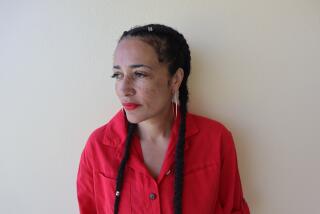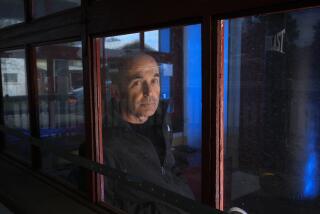Lives of the Poet
- Share via
William Wordsworth was a great Romantic poet, but he was not a very romantic man. When Jimmy Porter, the hero of “Look Back in Anger,” makes a crack about “Auntie Wordsworth,” he is exposing his own limitations; still, you know what he means. It is hard to imagine him talking about “Auntie Byron” or “Auntie Keats.”
It would have been a different story if Wordsworth had died young. In his 20s--he was born in 1770--he was famously swept up in the first millennial hopes of the French Revolution (“Bliss was it in that dawn to be alive . . .”); no less famously, he and Coleridge created a literary revolution of their own. (The first edition of their “Lyrical Ballads” was published in 1798; the second, with Wordsworth’s manifesto-like preface, in 1800.) But he lived on--lived on to be 80, and the image of the early Wordsworth has been overlaid by that of the later one: grave, solemn, infinitely respectable.
Yet it would be wrong to make too much of the contrast. The young Wordsworth was no stranger to solemnity, either. At every stage, in fact, the passion in his poetry coexisted with earnest deliberation (or, at worst, pure stodge). He was the most prosaic of great poets, and a corresponding sense of grayness clings to his personality.
The subtitle of Kenneth R. Johnston’s excellent biography--”Poet, Lover, Rebel, Spy”--reads as though it had been coined (by the publisher, perhaps, rather than the author) to counteract the duller aspects of the Wordsworth legend as strenuously as possible. The effect is rather too swashbuckling: It makes the author of “Tintern Abbey” sound a bit like Errol Flynn. But it doesn’t seriously misrepresent the substance, as opposed to the tone, of Johnston’s book. The poet, the lover and the rebel (though “revolutionary” might be a better word) are what he is largely concerned with. The spy, too--to a lesser degree, but the claim is sensational enough to warrant equal billing.
“The Hidden Wordsworth” is a very long book, but it takes the poet’s story only up to 1807, and it concentrates heavily on the 1790s. Johnston’s contention is that Wordsworth’s life during that decade was a good deal more dramatic than has previously been recognized, that his emotions were more confused and that his political commitments went deeper. It is here that the hidden Wordsworth is to be found, though, of course, the experiences he had at that time must also have helped to shape his subsequent development.
The first great expert on Wordsworth was Wordsworth himself. In “The Prelude” (which was not published until after his death), he left behind the finest autobiographical poem in the language. It is an incomparable source for many of his most intimate experiences. But, quite apart from the fact that its narrative only extends as far as his 24th year, it isn’t a sober record of events or a versified diary but the story of how he found his vocation, and in a work written from such a standpoint, a great many other things naturally get tidied up or left out.
Wordsworth’s earlier biographers may sometimes have been subtly misled by “The Prelude,” but they were hardly naive enough to take it entirely at face value. They also dug deep into the surrounding evidence, and Johnston acknowledges how much he owes them. If he can nonetheless claim to have revealed a Wordsworth whom they missed, it is partly as a result of turning up fresh facts, but more through reinterpreting their findings and still more through bold speculation. He is prepared to treat as near-certainties what others have seen as no more than possibilities. Where there is a gap in the record, he is happy to supply a conjecture.
What exactly was Wordsworth doing, for example, when he spent six weeks in Paris in 1792, at the end of his momentous year in France? There were many British sympathizers with the Revolution living in the city; Johnston’s account places him more firmly in their ranks than the bare record suggests. And did he return to France in the autumn of 1793? Unlike other biographers, Johnston doesn’t just concede the possibility (for which the evidence is slender). He dwells on it, asking exactly what it would have meant for the poet to have been in the country at the time.
In 1794, Wordsworth wrote to a friend outlining his plans for a journal to be called “The Philanthropist,” which, among other things, would have opposed the British government’s war against France and its repressive measures against radicalism at home. The following year a journal with the same name and a similar policy actually appeared. There is not hard evidence connecting Wordsworth with it (and the name “philanthropist” itself was very much in the air in liberal circles), but on the basis of a whole series of parallels and suppositions, Johnston argues strongly that he must have been involved.
The effect of Johnston’s speculations is not so much to locate the young Wordsworth further to the left than before as to invite readers to take his radicalism more seriously. Few British pamphlets of the 1790s were more fiercely committed to the cause of the Revolution than his “Letter to the Bishop of Llandaff,” for instance, written in 1793; and although he held back from publishing it at the time--it would have got him into deep trouble if he had--there has been nothing “hidden” about it for more than a century. (It first found its way into print in 1876.) Yet to encounter it in the context of Johnston’s narrative is to get a renewed sense of its vigor and of the turmoil through which Wordsworth must have been living when he wrote it.
Four years later, it was still possible to think of him as a seditious character. In 1797, he was staying in a village in Somerset with Coleridge and a well-known radical, John Thelwall. It was a period when there was widespread fear of a French invasion: The neighbors were suspicious, and a government agent was sent down from London to keep the three men under surveillance. Until now, in fact, if Wordsworth has figured in the annals of espionage at all, it is as one of the spied-upon rather than as one of the spies. But, thanks to Johnston, that may be about to change.
His contention that Wordsworth probably worked for British intelligence focuses on the seven months that the poet spent in Germany (still neutral territory in a Europe largely at war) from 1798 to 1799, first in the company of his sister Dorothy and Coleridge in the spy-ridden, exile-haunted city of Hamburg, then alone with Dorothy in the town of Goslar and other places (it is not clear where) to the south. He makes out an elaborate case, but the key exhibit is a secret service account book--which became available for inspection only in 1993--with two entries recording payments to a “Mr. Wordsworth.” Possibly the man referred to was another Wordsworth, but Johnston is ready with a number of secondary facts suggesting that it was indeed the poet--which would mean that within a year of coming under surveillance as a radical, he changed sides in a drastic fashion.
It is a good story, but I’m not sure, assuming it is true, quite what it proves. We could make more of it if we knew why Wordsworth agreed to work as an agent (out of patriotism? under duress?) and if we had some idea of what services he actually performed. As it is, I am struck by how little the episode does to alter my general sense of him as a man, let alone as a poet--or even (to the extent that he was) as a political poet. In the “Sonnets to Liberty,” for instance, written three years after his supposed undercover work, he left no doubt where he thought the choice lay in the conflict between Britain and Napoleonic France, but his patriotism was still strongly qualified by dismay at British realpolitik and self-aggrandizement--”Oh grief! that Earth’s best hopes rest all with Thee!” Hardly the words of a government hireling.
If your primary interest in Wordsworth is in his poetry, the most rewarding pages of Johnston’s account of his stay in Germany aren’t the ones devoted to speculation about spying but those dealing with his relationship with Dorothy. It was in Goslar that he wrote, among much else, four of the celebrated “Lucy” lyrics and, although Lucy can’t simply be equated with Dorothy, it would be difficult to deny--especially after reading Johnston’s subtle and closely argued account--that Wordsworth’s feelings for his sister were everywhere present in the poems’ creation.
The “lover” who features in the subtitle of “The Hidden Wordsworth” assumes three principal guises in the book: first, in relation to Mary Hutchinson, whom the poet eventually married; second, in relation to Annette Valloon, whom he got to know during his stay in France and who bore him a child; third, and most pervasively, in relation to Dorothy. Johnston writes well about all three, and his minute examination of Wordsworth’s residence in France enables him to devote more space than previous biographers to the affair with Valloon, but it is on Dorothy that he is at his best.
He doesn’t try to minimize the incestuous undertones of the feelings she and Wordsworth had for each other or the bizarre behavior they sometimes displayed. (On one hill-climb in the Lake District, they lay down next to each other in adjacent trenches, making believe they were in their graves.) But neither does he indulge in simplified scandalmongering, in what he calls “the expense of theory in a waste of shame.” The picture he presents is of a romance in which erotic feelings were constantly sublimated and diffused.
The book as a whole has the limitations of its chosen aim: It tells you more about where the mature Wordsworth was coming from than about what he was. But within its limits, it paints a convincing portrait, and--almost the highest praise I can think of--it justifies its length. There were times, taking a break from reading it, when I resented the hundreds of pages still stretching ahead. But whenever I got back to it, I was quickly won over again by the sheer fascination of the detail and by the feeling that I was being brought remarkably close to the grain of Wordsworth’s life.
More to Read
Sign up for our Book Club newsletter
Get the latest news, events and more from the Los Angeles Times Book Club, and help us get L.A. reading and talking.
You may occasionally receive promotional content from the Los Angeles Times.










